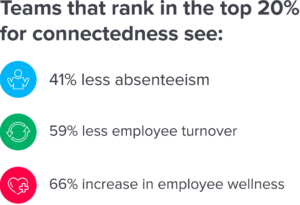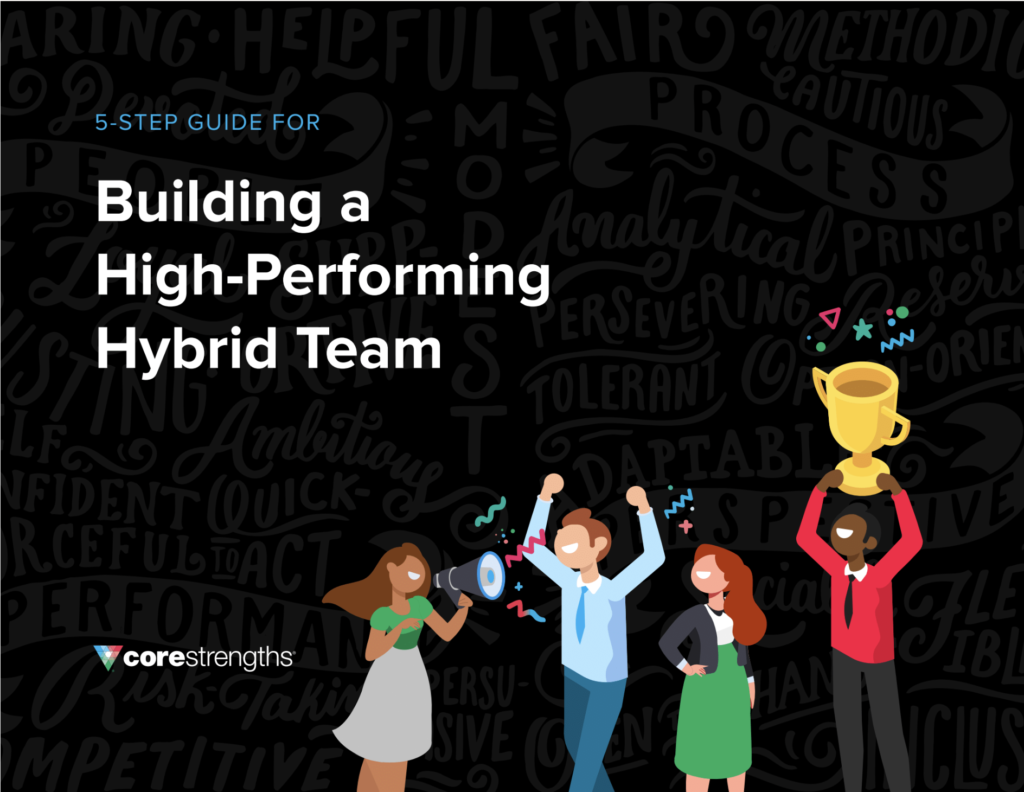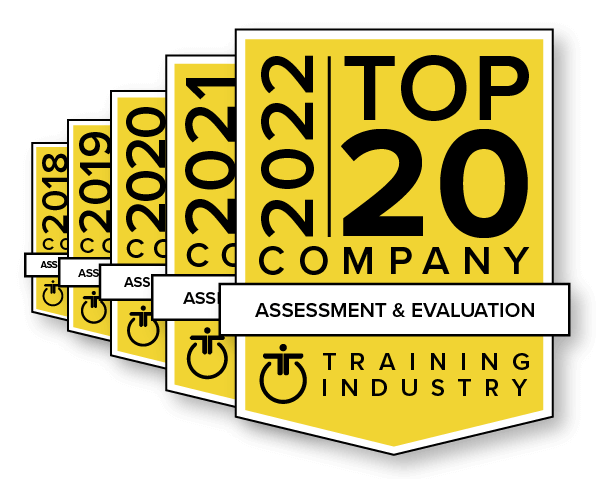Memorize these three words – Consistent. Superior. Results. (We’ll come back to them in a minute.)
A team is a group of people working together to achieve a common goal. Each member brings a unique perspective and strengths to the team that should make the group better if harnessed correctly. Unfortunately, the same attributes that should make us better are often the things that make it challenging to work together. But high-performing teams find a way.
What is a High-Performing Team?
Society for Human Resource Management (SHRM) defines high-performing work teams as “a group of goal-focused individuals with specialized expertise and complementary skills who collaborate, innovate and produce consistently superior results.” Consistent. Superior. Results.

When considering the many ways teams fall short (conflict, blame, apathy, absenteeism), it’s abundantly clear that building teams that deliver consistently superior results is easier said than done. But here are five foundational traits that can be developed in your teams.
5 Traits of High-Performing Teams
1. Psychological Safety
In 2012, Google’s People Operations wanted to determine why some teams thrive and others fail. They initially assumed that the best teams were made up of the “A” players. They reviewed academic research and studied hundreds of internal teams, and the results were more than a little surprising. The number one predictor of team performance is not, in fact, the aggregate level of talent on a team. Rather, it is the presence of psychological safety, “a shared belief held by team members that the team is safe for interpersonal risk-taking. It is a sense of confidence that the team will not embarrass, reject or punish someone for speaking up.”
Dr. Anita Woolley’s team at the MIT Center for Collective Intelligence found something similar as they measured the collective intelligence of groups. Their findings suggest that groups are collectively more intelligent when members are socially sensitive and allow everyone on the team to contribute their ideas. Diversity is also a contributor to collective intelligence—especially when there are more women on the team.
When the entire spectrum of team members can safely speak up without fear of embarrassment, this dynamic consistently leads to smarter team decisions.

2. Healthy Opposition
There’s a fine line between conflict and opposition, but there’s an enormous chasm between their outcomes. When there’s too much conflict – engagement and productivity suffer. Without enough healthy opposition to see all sides of an issue – innovation is nowhere to be found. The teams that understand how to manage the tension between the two outperform the rest.
Teams should always embrace differing perspectives. But if disagreement escalates, it can trigger conflict when the people involved feel that it’s an attack on their values. In other words, opposition can turn into conflict when it starts to feel personal. From experience, we know that people in conflict often don’t do their best work nor make the best decisions. Conflict often puts us into a defensive posture and makes it more challenging to have productive interactions with others. To prevent conflict, high-performing teams understand the people’s motives and values and respect those concerns. They avoid saying or doing things that would make them feel anything less than a highly valued member of the team.
One of the best ways to keep yourself out of conflict and productively engaged is to see others’ behavior through the lens of positive intent. If a colleague becomes critical, ask yourself if this is really an attack on you or simply their way of working toward a better idea or outcome? Even if it is a personal attack, do you really want to allow that person to pull you down? You get to decide.
Once we understand each other more, we can genuinely accept the differences that we all bring to a situation and hear people without making judgments based only on our own perspectives. This allows us to truly appreciate and value different points of view, fostering healthy challenge and debate. There’s no shortage of correlation between teams that actively pursue all sides of an issue and outstanding achievement.
It sounds simple, but the environment that encourages that kind of collaboration requires an adaptability in communication among team members that puts partnership first.

3. Effective Communication
According to The ThinkWise Impact of Team Performance Survey, the trait that high-performing teams utilize most to outperform average teams is effective communication. How we communicate with each other is fundamentally connected to our core values and motives. Teams communicate better when members understand their own intrinsic motives and learn to appreciate those of the people they’re working with.

High-performing teams know how to:
- Understand and respect each other’s views and differences.
- Recognize that we are all similar in some ways and that in other ways we are very different from each other.
- Appreciate that we all view the world through a different lens and therefore give and receive messages differently.
- Listen with the intent to truly understand the other person rather than to confirm their current view or wait for the opportunity to speak.
- Look beyond the communication style of the messenger to find the true intention and motive behind the words.
- Adapt their communication style to suit their audience.

4. Trust
To work well together, all the team members must trust each other. Teams that trust each other are not looking for hidden agendas or hidden meaning; they recognize that we all have different values and different communication styles and look below the surface to the intention and motive behind the behavior.
Trust is a two-way street. It’s both given and earned. The funny thing about trust is, it’s easier to give ourselves the benefit of the doubt while we’re much quicker to assume the worst of someone else. High-performing teams push past this temptation. They seek to understand first before they judge negatively. And in reality, high-performing teams extend trust by default. When trust is the norm from day one, teams rise to the occasion. When teams are built on a foundation of suspicion, no one operates at their best. High-trust teams are high-performing teams.

How your teams can build trust:
- Extend trust by default
- Be vulnerable and admit mistakes
- Be accountable and do the work
- Be open and truthful
- Include others

5. Relationship Intelligence (RQ)
High-performing teams prioritize the very thing that holds them together – their relationships. Even though people are complex, relationships don’t have to be when you have the right tools. Leaders create better teams when there is an emphasis placed on knowing what makes each team member tick and orchestrating more productive interactions between people.
That’s where Relationship Intelligence (RQ) comes in. RQ gives people insight on how to tailor their approach with others for a better outcome. This relational agility is aggregated from deep insight into four views of a person:
- the motives that drive behavior
- how people predictively experience conflict
- the behaviors (strengths) people use to get things done effectively
- how overdoing particular strengths can negatively affect coworkers and customers
Core Strengths measures RQ through the SDI 2.0 assessment, trains teams to collaborate effectively, reinforces RQ insight through the Core Strengths Platform, and ultimately helps teams apply their relational skills through feedback, coaching, and workplace software integrations.
Each is an essential part of building better teams. The more people from the broader enterprise operating with a shared understanding, the easier it is to build and leverage cross-functional relationships and increase appreciation for team diversity.
Teams that deliver consistently superior results make team members feel safe to be their authentic selves, embrace healthy opposition, are attuned to each other’s communication styles, build on a foundation of trust, and ultimately prioritize their relationships. If you’re interested in learning more about building high-performing teams with Core Strengths, book your personalized demo with a Core Strengths expert today.











